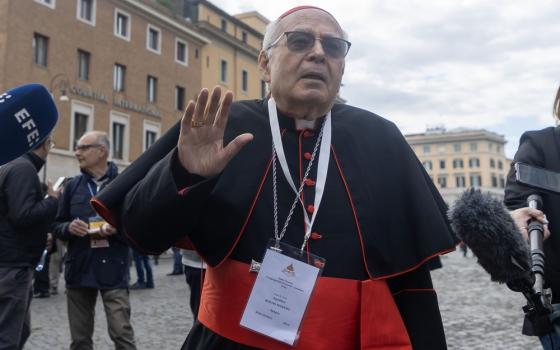Christmas is the comforting feast of God's taking on our humanity, and, except for sin, sparing himself none of the experiences from love to loneliness that we carried out of Eden with us. Our inheritance, even as we strive for holiness, is our being human. Ironically, we can never become saints unless we first become human.
That, of course, is one of the great lessons that the women religious of America taught us as they built the church in this and other countries. They took on the toughest jobs, like the company that cleans up after disasters with the promise that the site will look like nothing ever happened.
America's religious women, in effect, took on the challenge of cleaning up Eden after the Fall. The nuns as teachers, nurses, and all-round social workers did the day labor in the cities swollen by Catholic immigrants, living with the poor, the needy, and the uneducated, transforming them within a few generations into high achievers in -- and high contributors to -- American life and accomplishment.
America's religious women did that job not to make it look like the immigrants' struggle against the prejudice weighted odds never happened. Rather, they assisted in this transition, strengthening their people's faith as they did so, with a grace, transparency and humility that allow us still to see all the goodness they drew out of all the badness that really did happen in a country not ready to welcome the hordes of Catholic newcomers. As it was said of the great novelist Henry James, he loved the Europeans in their quaint villages but was horrified to see them moving into the sacred WASP precincts of Boston and Cambridge.
The nuns took on the humanity -- the unfinished imperfect state -- of the Catholics arriving from faraway places and taught them not only to beat the odds against them, but to take pride in the faith the good sisters instilled in them. They really worked this miracle of immigrant transformation, but the great-hearted religious women who brought it about did not claim and did not receive credit for it. They were forced to live invisible lives, and it was Monsignor's beet-red cheek next to the bishop's smoothly shaven jowls, scented by the spices of Araby, that loomed out of the picture of the opening of the school or church in the diocesan paper.
Now Roman officials, trailing the same aftershave aromas, voice their dismay at whether American women religious are keeping the Gospel at the center of their lives and work. These officials don't even want to hear of the leftovers from Eden that burden the clergy in such crises as that of the sex abuse of children who trusted them. They would like some ecclesiastical Servpro to cleanse the clerical culture and make it look as if nothing ever happened. They are ready to find fault with the American women religious who, at this celebration of God's taking on our human condition, have spent their lives in the midst of fractured human existence, showing us how holiness is found in the embrace of our imperfect lives, in making up by love for what is wanting in each of us. In a real sense, Christmas is their feast because it underscores how they have served the poor and disadvantaged who have sniffed a lot of odors but never that of aftershave.
Now let us review what was going on in Rome when the officials were investigating the nuns and should have been investigating themselves. It is interesting to note that no women were involved in such mysterious episodes of stealing confidential papers from Pope Benedict XVI's bedroom. The butler did it, the Vatican monsignors tell us.
But have you heard of the Spanish Archbishop Francisco Martinez Fernández of Granada, who was called to Rome to explain the reports of a ring of priest pedophiles active but undisciplined there? The archbishop "acknowledged that some accusations of abuse went unanswered, but said that he did not have enough information to justify more aggressive action," according to Catholic World News. Even Servpro couldn't make it look like this never happened. It does leave us with the human question: Who is more worthy of investigation, the American nuns who don't miss anything or the Spanish archbishop who can't find anything?
And who is yet to explain who gave permission to "a small group of radical feminists" who demonstrated Nov. 14 in St. Peter's Square? "Femen -- the group known for topless public protests -- simulated a sexual act before they were removed from the Vatican square by Italian police," Catholic World News reported.
Meanwhile, the Porsche Travel Club announced that it had arranged to use the Sistine Chapel for a reception. The director of the Vatican Museums, Antonio Paolucci, quickly denied that the chapel has been for rent, Except, of course, he acknowledged that the Vatican Museums have private tours for donors, which can include a concert in the Sistine Chapel. And, yes, the Porsche Travel Club had arranged just such a tour, which was expected to net about $200,000 for the museums. It was also announced that the Sistine Chapel installed a new lighting and air-conditioning system. If that happened in Chicago, the connection between the Porsche Motor Club and improvements for the Sistine Chapel would be understood as a classic example of the fix being in. Perhaps it is to distract us from such deals that these men are so noisily investigating women religious.
Instead of looking into these sorts of matters with appropriate editorial condemnation, the Vatican newspaper L'Osservatore Romano lauded "The Simpsons," citing an analysis in La Civilta Cattolica that said it is "one of the few television shows for kids in which the Christian faith, religion and questions about God are recurring themes."
More recently, Catholic News Agency reported that "Catholic experts say occult activity and the resulting need for exorcisms has reached a critical level." They describe "an increase in demonic activity." Meanwhile, L'Osservatore Romano moved from "The Simpsons" to another lighter-than-air demonic problem, highlighting a crisis in sacred music associated with, according to Pope Benedict XVI, a misinterpretation of the Second Vatican Council.
The stature and achievement of American women religious only grows in comparison with these Vatican follies. The sad part is that these good women must negotiate with the men behind these strange occurrences. That is like handing matches to fire-starters.
Perhaps nobody was surprised, then, by the news that a "Frankenstein" film clip from 1931 mysteriously turned up in the Vatican archives. Vatican researchers had no explanation for it.
[Eugene Cullen Kennedy is emeritus professor of psychology at Loyola University Chicago.]
Editor's note: We can send you an email alert every time Eugene Cullen Kennedy's column, Bulletins from the Human Side, is posted. Go to this page and follow directions: Email alert sign-up.






